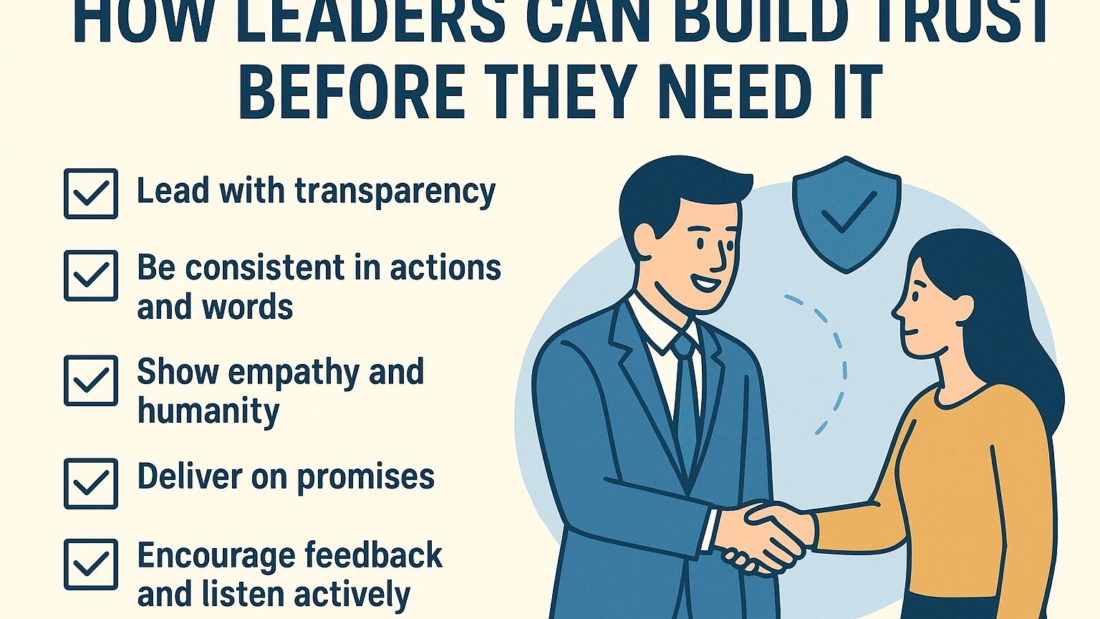In today’s fast-changing business environment, leadership is not just about authority — it’s about trust. Teams look to leaders not only for direction but also for assurance, empathy, and authenticity. Yet, trust is often treated as something to rebuild after it’s broken rather than something to cultivate before it’s tested. The best leaders know that trust must be intentionally built long before it’s needed.
Why Building Trust Early Matters
Trust acts as the invisible currency that powers collaboration, innovation, and resilience. When a leader has earned the trust of their team, they can navigate challenges more smoothly, handle change effectively, and sustain morale even under pressure.
When trust is absent, communication breaks down, employees second-guess decisions, and performance suffers. Rebuilding trust after it’s been lost is far more difficult than developing it proactively. That’s why great leaders invest early — building credibility, consistency, and psychological safety from day one.
1. Lead with Transparency
Transparency is the cornerstone of trust. Teams respect leaders who communicate openly, even when the truth is uncomfortable. Whether it’s discussing company performance, project setbacks, or organizational changes, being transparent signals honesty and integrity.
Leaders can build transparency by:
- Sharing both wins and failures honestly.
- Explaining the “why” behind major decisions.
- Encouraging questions and open dialogue.
When people feel informed and included, they’re more likely to believe in their leader’s motives — and more willing to follow them through uncertainty.
2. Be Consistent in Actions and Words
Nothing erodes trust faster than inconsistency. Leaders who say one thing and do another quickly lose credibility. On the other hand, leaders who act consistently with their stated values and commitments reinforce trust with every decision they make.
Consistency doesn’t mean rigidity — it means reliability. Even when circumstances change, a leader’s principles and sense of fairness should remain steady. Teams should never have to guess which version of their leader they’ll encounter that day.
3. Show Empathy and Humanity
Trust grows in environments where people feel seen and understood. Empathy is not just a soft skill; it’s a leadership essential. When leaders genuinely care about their team members as people — not just as employees — they create emotional safety and belonging.
Small actions matter:
- Checking in on team well-being.
- Listening without judgment.
- Recognizing personal milestones or challenges.
Empathetic leadership doesn’t weaken authority; it strengthens it. People are more likely to trust leaders who balance professionalism with compassion.
4. Deliver on Promises
Trust is built through reliability over time. When leaders consistently follow through on their promises — whether it’s a project commitment or a personal assurance — they prove that their word has weight.
Broken promises, even minor ones, send a message that reliability is negotiable. A leader who delivers results, keeps commitments, and communicates proactively about setbacks earns lasting respect.
5. Encourage Feedback and Listen Actively
Building trust is not a one-way process. The most trusted leaders create channels for open feedback and genuinely listen to what their teams say.
When leaders invite input, acknowledge valid concerns, and act on constructive feedback, they signal humility and respect. It shows that they value collaboration over ego — and that trust is mutual, not hierarchical.
Listening also means being fully present. Instead of formulating a reply while someone speaks, trusted leaders focus on understanding. This subtle but powerful act builds deeper connection and loyalty.
6. Admit Mistakes Quickly
No leader is perfect, and pretending to be can destroy credibility. Teams don’t expect flawless leaders — they expect honest ones. Owning mistakes early demonstrates accountability and self-awareness.
When a leader says, “I was wrong, and here’s how I plan to fix it,” they model the kind of behavior they want their teams to adopt. Admitting errors builds authenticity and shows that trust is more valuable than pride.
7. Empower, Don’t Micromanage
Trust is reciprocal — leaders who trust their teams are more likely to be trusted in return. Micromanagement sends a signal that leaders don’t believe in their team’s abilities. Empowerment, on the other hand, communicates confidence and respect.
Leaders can empower teams by:
- Delegating meaningful responsibilities.
- Encouraging autonomy in decision-making.
- Supporting risk-taking and innovation.
When employees feel trusted to perform, they’re more engaged, accountable, and motivated — creating a virtuous cycle of mutual trust.
8. Build Relationships Beyond Work
Trust deepens when relationships extend beyond daily tasks. Taking time to connect on a personal level — whether through team lunches, casual conversations, or recognizing individual contributions — humanizes leadership.
These interactions don’t need to be forced or overly formal. Genuine interest in people’s lives builds emotional capital that leaders can draw upon in challenging times.
9. Communicate Vision and Values Clearly
A team’s trust in their leader often stems from alignment with shared purpose. When leaders articulate a clear vision and live by core values, they give teams something to believe in beyond short-term goals.
People trust leaders who provide direction and demonstrate integrity in how they pursue it. Clear communication of vision, paired with consistent action, inspires both confidence and commitment.
The Long-Term Payoff of Proactive Trust
When crises arise — whether it’s a failed project, organizational change, or market downturn — leaders who’ve built trust in advance can rely on the goodwill they’ve earned. Their teams give them the benefit of the doubt, stay engaged, and rally behind their leadership.
Proactive trust-building isn’t a one-time effort; it’s a daily practice. It’s woven into how leaders communicate, make decisions, and treat others. By investing in trust before they need it, leaders ensure that when challenges come, they don’t stand alone — they stand supported by a loyal, confident, and resilient team.

